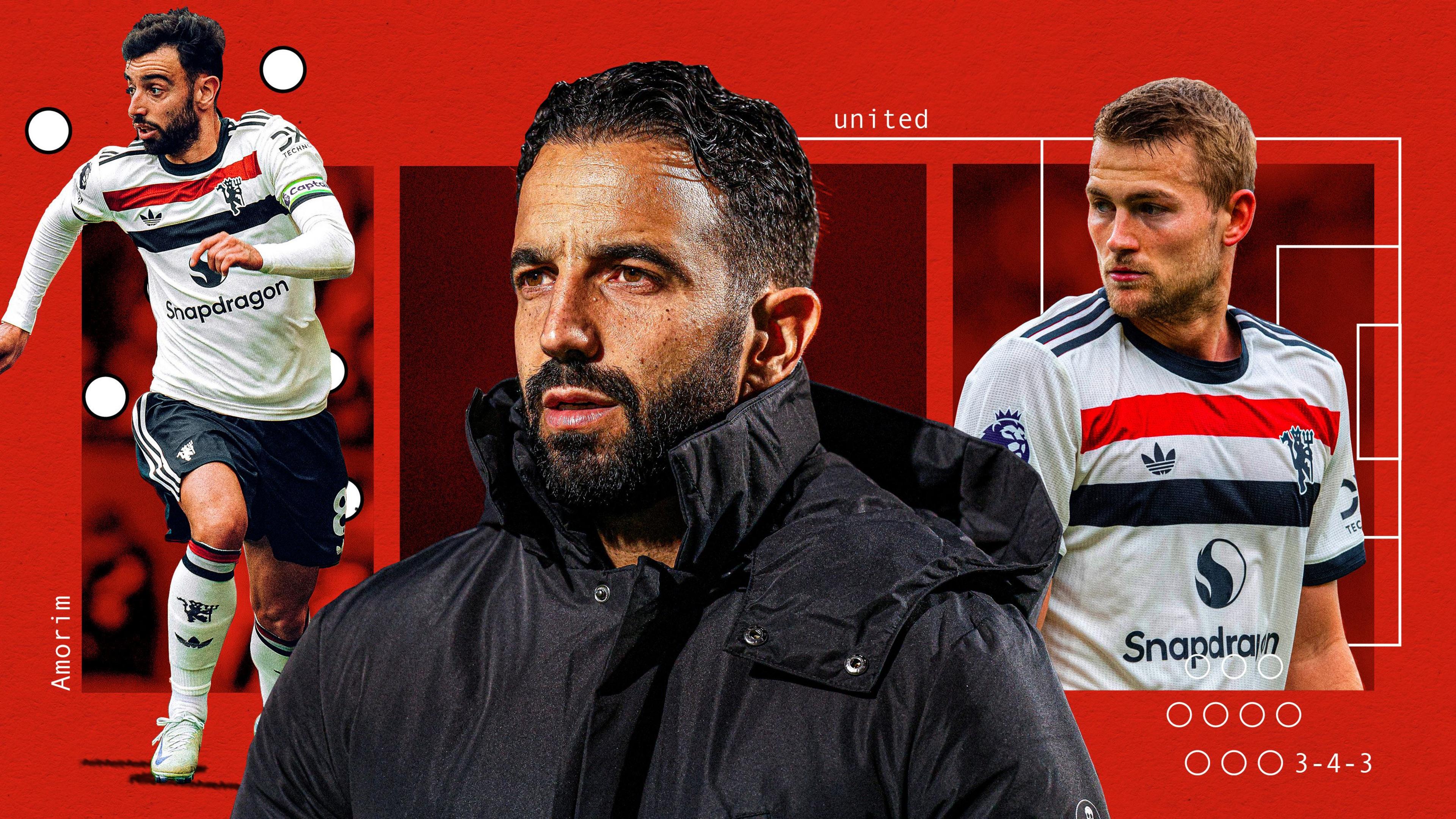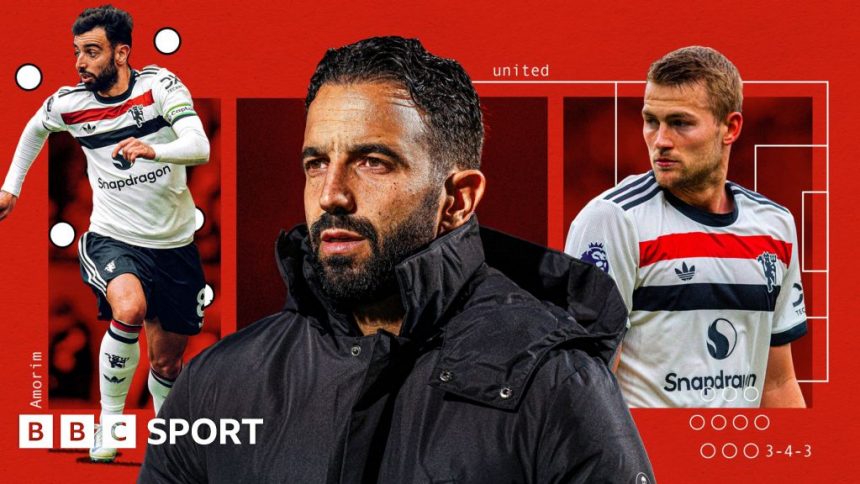Amorim tactics: Ending the ‘donut’ and taming Fernandes – what’s in store?

Ruben Amorim has played with a three at the back formation since the very beginning of his coaching career
-
Published
As Manchester United supporters prepare to welcome a highly-rated and talented coach from outside of Europe’s ‘big five’ leagues who has analysts swooning, they may be worried that it all sounds a bit familiar.
But in Ruben Amorim, they can be certain that in one crucial aspect he won’t be anything like Erik ten Hag.
The defining complaint about the sacked Dutchman was that after two-and-a-bit seasons the football was still formless and the tactical direction indecipherable.
Amorim, who is set to leave Portuguese champions Sporting to move to Old Trafford, is nothing if not a diligent – and decisive – tactical thinker.
From a ruthless press to proactive possession football, from a daring high line to a complexly shape-shifting 3-4-3 formation, the hallmarks of Amorim’s football will be etched into muscle memory in detailed training sessions.
And there will be valid concerns. Most prominent will be how a Manchester United squad built in Ten Hag’s image will cope with the change to a back three and a tactical system entirely at odds with what came before. It won’t suit everyone.
With United posting a £113m net loss for 2023-24, a £15m compensation bill for sacking Ten Hag and paying at least £8m to trigger Amorim’s release clause, added to the £200m spent on summer transfers, the Portuguese is not likely to have much budget for January signings.
Here’s a look at the biggest winners and losers from Amorim’s appointment
De Ligt, Maguire & three at the back
Manchester United signed defender Matthijs de Ligt for more than £38m from Bayern Munich in August
Amorim is, first and foremost, a flexible tactician.
He will sit deep when required and push high when he can; will play neat possession football in some fixtures and tell his players to hit longer diagonals out to the wide men in others.
Case in point: Sporting topped the charts in Portugal for both build-up attacks (126) and direct attacks (74) last season.
But one thing that doesn’t change is the 3-4-3 formation, which is rumoured to be a factor in why Liverpool favoured Arne Slot over Amorim when Jurgen Klopp left this summer.
That means Manchester United will revert to a back three for the first time in a decade – since the early days of Louis van Gaal in 2014.
The average position of Sporting’s players in a 3-0 victory over Estoril in September 2024 highlights the precise choreography of Amorim teams.
De Ligt, the marquee summer signing, is the most likely to struggle. He didn’t look comfortable when Bayern Munich experimented with a back three under Julian Nagelsmann in 2022-23 and was dropped from Louis van Gaal’s Netherlands back three just one game into the 2022 World Cup.
Harry Maguire is the only United player used to a back three, and inexperience here is a particular concern given that Amorim’s aggressive high line leaves space out wide and in behind.
The Premier League is increasingly defined by the sort of fast transitions that could expose this vulnerability, and we saw the downsides of Amorim’s approach when Manchester City tore through Sporting in a 2022 5-0 Champions League win in Lisbon.
Then again, any downsides from the switch may be countered by the basic defensive advantage of moving from a four to a five.
After all, last season United conceded the second most shots of any team in Europe’s ‘big five’ leagues (667) whereas Sporting, in a compact off-the-ball 5-4-1, conceded the fewest shots in the Primeira Liga (269).
Dalot, Amad & attacking wing-backs
The wing-backs play a crucial attacking role in Amorim teams, stretching the play to allow the wingers to drift infield and get tight to the striker.
United do not have any natural wing-backs in the squad but if Amorim is to convert a couple he will prioritise the players more comfortable attacking than defending.
That’s an accurate description of Dalot, who created 38 chances in the Premier League last season, the third most of any United player, and could be pushed forward.
Not that the defensive side isn’t important, and Dalot has come under fire this season for difficulties defending the back post, notably losing Brennan Johnson for the opener in a 3-0 defeat by Tottenham Hotspur and Crysencio Summerville in last weekend’s 2-1 defeat at West Ham.
Diogo Dalot’s passes in West Ham 2-1 Man Utd on 27 October 2024 (green = successful passes; red = unsuccessful)
For an alternative, Amorim could go maverick, or delve into United’s highly-rated youth set-up.
He has already converted Sporting’s tricky 17-year-old winger Geovany Quenda into a wing-back this season. Maybe Amad Diallo, then, will be a surprise rival to Dalot on that side.
Sporting right wing-back Geovany Quenda’s passes in Famalicao 0-3 Sporting on 26 October 2024 (green = successful, red = unsuccessful)
Ugarte to help fill ‘donut’
Manuel Ugarte joined Manchester United in a deal worth up to £50m
The man signed to close Ten Hag’s infamous donut – the midfield hole that opens up when United’s forwards press and defenders backtrack – has previously enjoyed success under Amorim.
Ugarte made his name at Sporting, where in 2022-23 he topped the Portuguese charts for tackles and interceptions (179) as the chief destroyer in Amorim’s double pivot.
He can be the leader on the field; the man already embodying Amorim’s tactics and inspiring others to match his intensity.
Man Utd’s tackles and interceptions in a 2-0 defeat to Tottenham in August 2023 neatly shows the Ten Hag ‘donut’ issue – the hole in the middle of the pitch. Note how few defensive actions take place in the central midfield area
Pundit after pundit has dissected United’s lack of co-ordinated pressing, with Sky’s Jamie Carragher labelling Ten Hag’s side as “one of the worst coached teams” he had seen.
Last season United’s opponents registered 620 transitions reaching the final third, more than any other Premier League side, reflecting the enormous gap Ugarte was signed to patch up.
By contrast, so far in 2024-25 Sporting’s passes per defensive action (PPDA), a measure of pressing intensity, is 9.5, a score bettered only by Tottenham Hotspur (7.8) and Arsenal (9.2) in the Premier League.
Just in front of Ugarte, Amorim will want a more graceful player to slalom into the next line, and here is where Kobbie Mainoo or Mason Mount – hard-working and intelligent, in the Amorim mould – may come to the fore.
Ugarte’ season-high 12 tackles in Sporting’s 3-0 victory against Frankfurt in the 2022-23 Champions League. Eight tackles were successful (green) and four were unsuccessful (red).
How do Fernandes & Rashford fit?
Bruno Fernandes was made Manchester United club captain under Erik ten Hag
Amorim’s wingers, who sit just behind the striker to form a box-shape with the two central midfielders, tend to be direct runners capable of pressing hard and weaving their way through the lines in the transition.
His wingers are expected to run at defenders, hence why Sporting top the Primeira Liga charts this season for progressive carries (262).
In other words, Amorim prefers the polar opposite of the mercurial Fernandes, a traditional number 10 whose free roaming might not work in such a fine-tuned system.
Alejandro Garnacho, on the other hand, could be the perfect fit. He loves to dribble through a crowd, completing 41 progressive carries this campaign, not far off double that of any other United player.
Another possible beneficiary is Marcus Rashford, who loves to cut in off the left and run at defenders. In 2022-23, when he scored 30 goals in all competitions, Rashford attempted more dribbles (138) than any other Premier League player bar Bukayo Saka (147).
However, Rashford would need to recapture those 2022-23 levels, with his progressive ball carry figures only at 16 this season.
Fernandes, who took a season-high 113 touches in September’s 0-0 draw with Crystal Palace, roams all over the pitch in search of the ball.
Hojlund in Gyokeres mould
Sweden striker Viktor Gyokeres has 62 goals and 19 assists in 64 games across all competitions for Sporting – as of 31 October.
Viktor Gyokeres has been a revelation for Amorim, scoring 41 goals in 42 league games with a mixture of targeted runs, pressing intensity, and power in the penalty area; three attributes Ten Hag used to describe Hojlund when he arrived at Old Trafford in August 2023.
“He is a real frontman,” Ten Hag said about Hojlund. “Very direct to the goal, very good presser, a physical presence.”
Amorim moved to a slightly more direct style of football after Gyokeres joined from Coventry City last summer, upping the verticality of his team to get it into the feet of his powerful frontman, so it’s likely Hojlund will be deployed in a similar fashion.
That adaptation is instructive.
Amorim is more than willing to alter his tactical set-up to suit the strengths and limitations of his players, suggesting that even those players who don’t look like an obvious fit could find a manager willing to bend for now… well apart from three at the back.
Related topics
-
-
Published3 days ago
-
-
-
Published3 days ago
-
-
-
Published6 June
-





